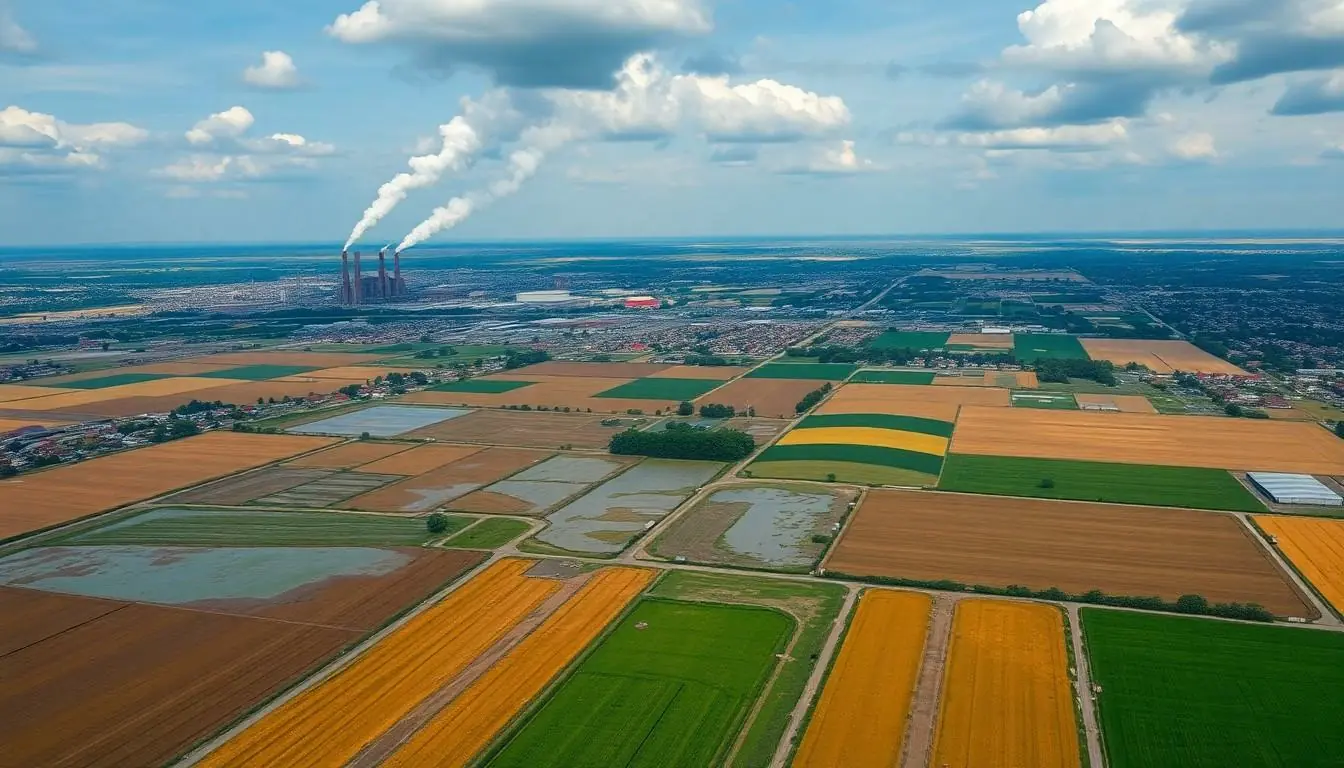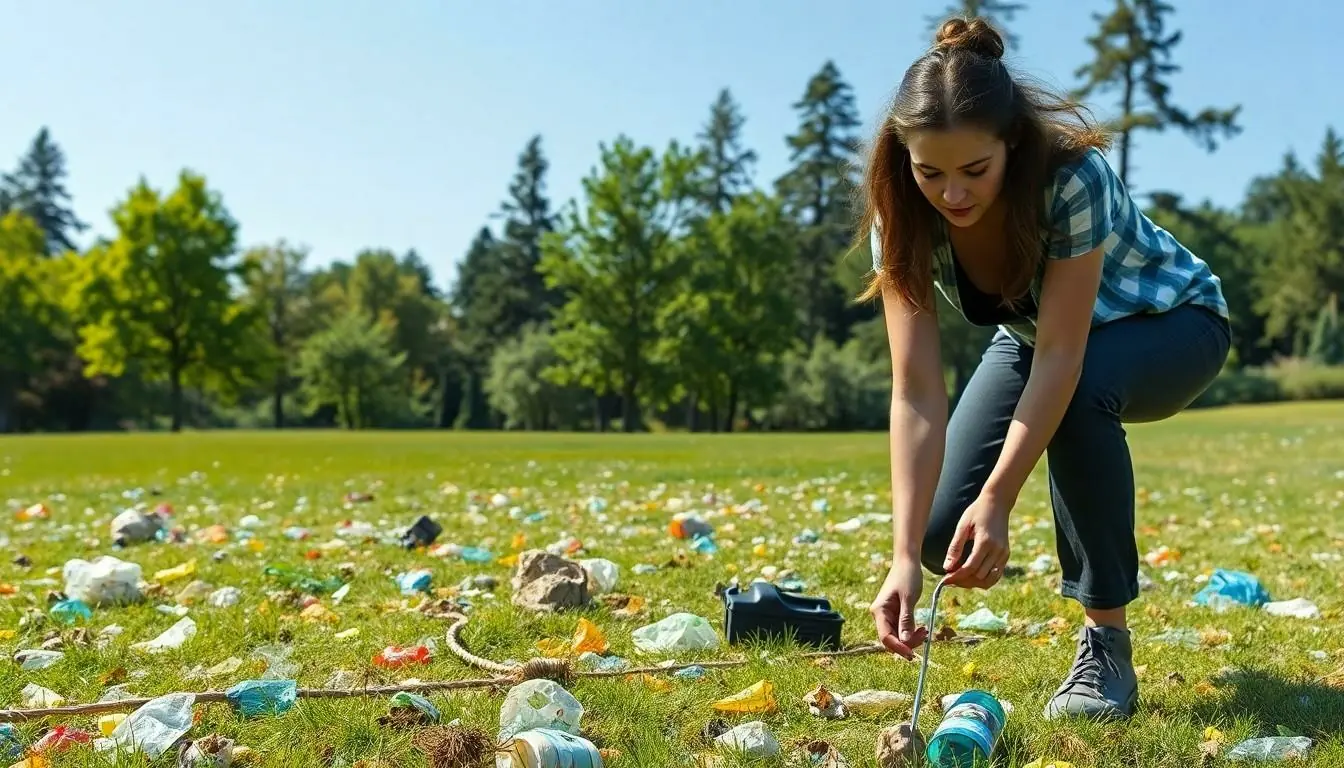Land pollution isn’t just an eyesore; it’s a growing concern that affects every single one of us. Picture this: a beautiful park, lush green grass, and suddenly—bam!—a mountain of plastic waste crashes the party. It’s not just the trash that’s ruining the vibe; it’s the harmful practices behind it.
Table of Contents
ToggleOverview of Land Pollution
Land pollution arises from various human activities that introduce harmful substances into the environment. Toxic waste disposal significantly degrades soil quality. Inadequate management of solid waste leads to increased trash accumulation in urban areas. Industrial practices often release contaminants into the ground, posing risks to ecosystems and human health.
Agricultural practices also play a crucial role in land pollution. The excessive use of pesticides and fertilizers can result in runoff, which contaminates soil and water sources. Each year, millions of tons of chemicals permeate agricultural fields, causing biodiversity loss.
Mining activities contribute to extensive land degradation. Soil erosion and habitat destruction stem from resource extraction processes. According to the United Nations Environment Programme, mining operations reduce natural landscapes, affecting wildlife habitats and local communities.
Landfill sites represent another source of pollution. Over time, they release leachate, which can seep into soil and groundwater. Leachate contains hazardous materials, leading to serious environmental risks. The average US landfill can produce more than 20,000 tons of waste per acre annually, underscoring the scale of the issue.
Urban development frequently alters natural landscapes, leading to soil compaction and reduced fertility. The construction of buildings and roads disrupts natural drainage systems, exacerbating runoff issues. This transformation often results in increased flooding risks and diminished agricultural productivity.
Efforts to manage land pollution require a multifaceted approach. Implementing sustainable waste management practices can minimize harmful waste disposal. Encouraging responsible agricultural techniques and promoting recycling initiatives helps protect land resources. Prioritizing education and policy reform remains vital in addressing these pressing environmental challenges.
Major Contributing Practices

Land pollution stems from several significant practices, each contributing uniquely to environmental degradation.
Agricultural Practices
Excessive reliance on pesticides and fertilizers leads to substantial soil and water contamination. Runoff from agricultural fields introduces toxic chemicals into local waterways, harming biodiversity. Crop production often depletes soil nutrients, further reducing agricultural sustainability. According to the World Health Organization, improper pesticide use affects both human health and ecosystems. Farmers adopting organic practices often report better soil health and reduced pollution levels.
Industrial Waste
Industrial waste management issues contribute heavily to land pollution. Factories frequently release hazardous materials directly into the environment, creating contaminated sites. The U.S. Environmental Protection Agency identifies improper disposal of industrial byproducts as a leading cause of land degradation. Some industries neglect proper waste treatment, resulting in leachate that infiltrates groundwater. Companies implementing stricter waste management protocols often see significant improvements in environmental outcomes.
Urbanization and Land Development
Rapid urbanization reshapes natural landscapes, presenting severe consequences for land quality. Construction activities compact soil, leading to reduced fertility and increased runoff. Urban areas generate substantial amounts of solid waste, overwhelming municipal landfills. According to research by the United Nations, over half of the world’s population now resides in urban areas, intensifying waste generation issues. Addressing urban sprawl with sustainable development practices fosters healthier ecosystems and mitigates land pollution.
Analysis of Each Practice
Various practices contribute significantly to land pollution, each impacting soil health and ecosystem integrity.
Agricultural Practices Impact
Agricultural practices rank high among the contributors to land pollution. Excessive pesticide and fertilizer use leads to chemical runoff, which contaminates soil and nearby water sources. Runoff affects local biodiversity, severely impacting aquatic life. Soil nutrient depletion results from continuous crop production, further undermining agricultural sustainability. In contrast, studies indicate that farmers utilizing organic methods achieve healthier soils and lower pollution levels, aligning agricultural practices with environmental health.
Industrial Waste Management Issues
Industrial waste management remains a critical issue. Factories that dispose of hazardous materials improperly introduce contaminants into the land. According to reports, leachate from landfill sites, often laden with toxic substances, seeps into surrounding environments, damaging soil and water quality. Stricter regulations and improved waste management protocols are essential to curb this pollution. Adopting cleaner technologies in manufacturing processes can mitigate harmful effects on the land and promote a more sustainable future.
Urbanization Effects on Land Quality
Urbanization affects land quality significantly. Rapid development alters natural landscapes, leading to soil compaction that reduces fertility. Reduced agricultural productivity often follows urban sprawl, increasing flooding risks in developed areas. Municipal landfills face overwhelming waste generation from growing populations, exacerbating pollution levels. Sustainability efforts aimed at green spaces and effective waste management can enhance urban environments, promoting healthier ecosystems and improving overall land quality.
Mitigation Strategies for Reducing Land Pollution
Implementing effective mitigation strategies significantly reduces land pollution. Sustainable waste management practices play a crucial role. By employing methods like composting and recycling, communities can minimize the amount of waste entering landfills.
Adopting responsible agricultural techniques also makes a difference. Organic farming methods, which emphasize natural pest control and reduced synthetic input, enhance soil health. Reports indicate that farmers practicing organic methods experience lower pollution levels and improved soil ecosystems.
Education and community involvement contribute to raising awareness around land pollution. Workshops can help residents understand the impact of improper waste disposal. Engaging local stakeholders ensures that everyone participates in pollution reduction efforts.
Policy reform is essential for establishing stricter regulations. Governments can enforce laws that govern industrial waste management. Implementing penalties for non-compliance encourages industries to adopt sustainable practices, drastically improving environmental outcomes.
Investing in green infrastructure supports urban areas and reduces compaction. Innovative designs like permeable pavements and green roofs increase water infiltration. These designs reduce flooding risks while promoting healthier ecosystems.
Recycling initiatives help keep materials in use longer. Effective programs can transform recyclable materials into new products, limiting waste generation. Many cities have seen decreased landfill use through successful recycling campaigns.
Collaborative partnerships between public and private sectors can enhance mitigation strategies. Joint efforts ensure resources are shared and more comprehensive solutions are developed. Such collaborations lead to sustainable development practices that benefit both communities and the environment.
Lastly, community clean-up events foster a sense of ownership over local spaces. Volunteers contribute to minimizing litter and promoting environmental stewardship. Engaging local citizens cultivates pride and responsibility for maintaining pollution-free areas.
Addressing land pollution requires a concerted effort to understand and mitigate its primary contributors. Agricultural practices particularly the excessive use of pesticides and fertilizers emerge as leading factors that compromise soil and water quality. Industrial waste management also plays a crucial role as improper disposal of hazardous materials continues to threaten land integrity.
Rapid urbanization further complicates the issue by altering natural landscapes and overwhelming waste management systems. Emphasizing sustainable practices such as organic farming responsible waste management and community engagement can lead to healthier ecosystems. By prioritizing education and policy reform society can take significant strides toward reducing land pollution and preserving the environment for future generations.





